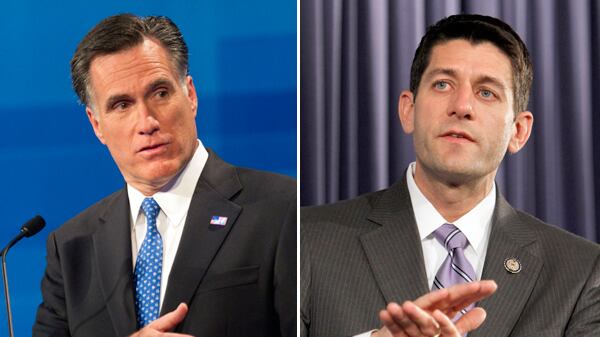Suddenly Republicans are wondering: is Mitt Romney really so electable after all?

Turns out Rick Santorum won Iowa. Newt Gingrich’s attacks on Romney’s record at Bain have drawn blood. More blood has flowed from Romney’s own admission this week that he pays a tax rate of only about 15 percent on his ample income. Then there’s Romney’s offhand dismissal of the $374,000 he earned in speaking fees in 2011—enough in itself to qualify Romney for the top 1 percent—as “not very much.” All of which has led political analyst Jeff Greenfield to quip, “Only way for Mitt to look more like embodiment of wealth is to wear a top hat and monocle (thank God he doesn’t smoke cigars!)”
Yet in itself, great personal wealth need not be an obstacle to the presidency. John F. Kennedy was wealthier than Mitt Romney, and Lyndon Johnson not a lot less so. The two Roosevelts were likewise far from poor; ditto the two Bushes.
Romney, however, seems already type-cast as a dangerously out-of-touch Richie Rich.
The journalists and commentators who watch his campaign tend to blame Romney personally for the disconnect. Little gaffes get magnified into campaign-wrecking disasters, like describing $374,000 in speaking fees as “not much.”
But when a campaign is connecting, it can ride out gaffes. Bill Clinton reached the White House despite Hillary Clinton dismissing at-home moms as “staying home to bake cookies,” and Obama rode out the fuss triggered by a tape recording of his description of rural white voters “clinging to their guns and religion.”
Romney’s trouble is not his too-pressed shirts or his too-coiffed hair or even his tax returns. Bill and Hillary Clinton also had a tax return problem in 1992: it was revealed that they had claimed a tax deduction for donating used socks and underwear to Goodwill. It looked petty and grasping. They won anyway.
Romney’s problem is not his wealth. It is his apparent lack of concern for others’ nonwealth. But that lack of concern has been sharpened to a dangerous point, not by Romney himself, but by the missteps of his party.
Why would the typical voter care whether Romney is rich or not? From the point of view of the typical voter at the median household income of $49,500, all the presidential candidates look rich. They almost always do.
The question of utmost concern to the voter is, what will these rich politicians do for me? Or to me?
And here’s where Romney faces his real challenge—2012 will be a tough re-elect for Barack Obama. When Democrats face tough elections, there is one thing they can always be counted on to do: accuse Republicans of having a secret plan to eliminate Medicare. Jimmy Carter did it in the presidential debate of 1980: “Governor Reagan, as a matter of fact, began his political career campaigning around this nation against Medicare.” Bill Clinton did it in his duel against Newt Gingrich in 1995-96: “Yesterday [congressional Republicans] sent me legislation that said—we will only keep the government going, and we will only let it pay its debts if and only if we accept their cuts in Medicare, their cuts in education, their cuts in the environment, and their repeal of 25 years of bipartisan commitments to protect the environment and public health.”
President Obama would dearly like to do it again in 2012. But this time, Republicans made it easy for him. Obama does not have to accuse them of having a secret plan to eliminate Medicare. In 2011, all but four House Republicans and all but five Senate Republicans voted for a very public plan to withdraw the Medicare guarantee from Americans younger than age 55.
The Paul Ryan plan would instead offer future retirees support to buy a private insurance plan—with the amount of the support rising at the rate of general inflation. If health care costs continue to rise during the next three decades at the same pace as in the past three decades, then—under this proposal—today’s 30-somethings would receive support sufficient to cover about 25 percent of their Medicare costs, leaving them to find the other 75 percent themselves. The money saved would be applied to balance the budget and finance a big tax cut, reducing the top income-tax rate to 28 percent from the otherwise scheduled 39.6 percent.
Conservative columnist Charles Krauthammer at the time expressed worry that the Ryan plan might prove a “suicide note.”
And at first Mitt Romney shrewdly kept his distance. “I appreciate what Paul Ryan has done,” Romney said on May 27, 2011, and cautiously added, “I’m going to have my own plan.” Asked whether he’d sign the plan, Romney demurred: “That’s the kind of speculation that is getting the cart ahead of the horse.”
A week later, Romney’s resistance was weakening. Asked June 2, 2011, whether he would sign the Ryan plan if it comes to him, he said yes, but added again, “I’m going to have my own plan.”
Through the fall, Romney yielded more and more ground to pressure from congressional Republicans entranced by Ryan’s vision.
In November, Romney did at last release that Medicare plan of his own. Structurally, the Romney plan resembled Ryan’s. But it remained vague on the key feature: how much premium support would future seniors get?
Then Gingrich began to rise in the polls, the first adversary to seriously worry the Romney campaign. To protect his right flank, Romney in December for the first time expressed unequivocal support for the Ryan plan—and the end of the Medicare guarantee for those now under 55.
Would a President Romney do such a thing? Would Congress really ultimately go along with it? Probably not and certainly not. But can President Obama credibly allege that a President Romney might do it? And will those allegations exact an electoral cost?
If the answers to those questions prove to be “yes,” conservative critics will blame Romney for his “weakness” as a candidate. But the real weakness will be that Romney acceded to those conservatives’ pressure to co-sign Paul Ryan’s suicide note.






